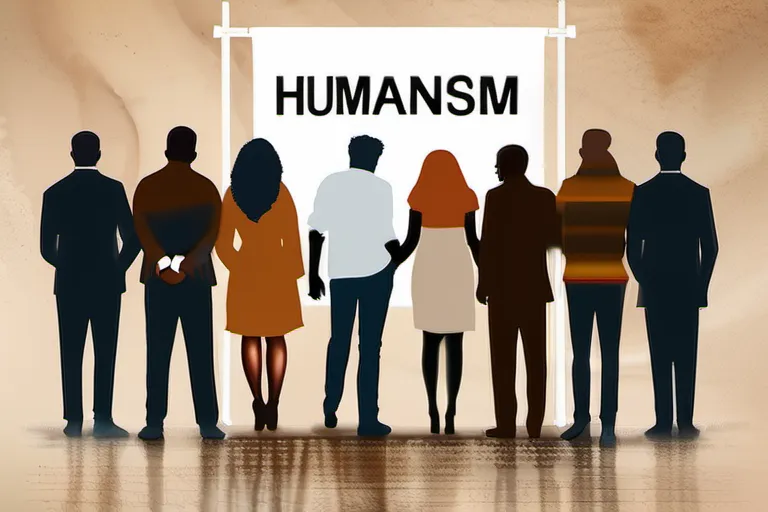Exploring the Relevance of Humanism in Modern Times
In today’s diverse and complex world, understanding different belief systems is crucial. This article delves into the importance of humanist beliefs in contemporary society, discussing their impact on various aspects of life.
The Foundations of Humanism
When we trace back to the origins of humanism, it’s like delving into the roots of a mighty oak tree. The concept of humanism emerged in the Renaissance period as a shift away from the dominant religious and medieval views that had shaped European society for centuries. This movement emphasized reason, individualism, and an appreciation of the natural world—a stark contrast to the prevailing dogma of the time.
So, what exactly are the principles that define humanism? At its core, humanism is about valuing human beings and their potential for good. It advocates for ethical values based on reason rather than tradition or superstition. This belief system holds that people should be judged by their actions and character, not by their faith or adherence to religious doctrine.
Key figures in the development of humanist thought include Renaissance giants like Leonardo da Vinci and Niccolò Machiavelli, who not only contributed to the arts and sciences but also championed a new way of thinking. These luminaries paved the way for thinkers like John Stuart Mill, who further developed these ideas in his writings on liberty and social reform.
The importance of humanist beliefs in today’s society cannot be overstated. In an era where technology is transforming every aspect of our lives, it becomes imperative to question the values that guide us. Humanism reminds us to consider the dignity of all individuals, regardless of their background or status. It encourages us to strive for a more equitable and compassionate world.
Reflect on this: If humanism is about recognizing the inherent worth of every person, how can we apply these principles in our daily lives? Could it be as simple as treating others with respect and kindness, or could it involve advocating for policies that promote social justice and equality?
As we navigate through the complexities of modern society, the wisdom of humanism serves as a guiding light. By embracing its core values, we can foster a more inclusive and humane world—one where every individual has the opportunity to thrive and reach their full potential.
Humanism in Modern Society
How can humanist beliefs remain relevant in today’s society where technology, globalization, and social media have transformed every aspect of our lives? The answer lies in understanding how these beliefs shape our interactions, values, and decision-making processes.
Think about it this way: humanism is like a lighthouse in the stormy sea of modern life. It guides us towards moral clarity and ethical behavior, helping us navigate through complex issues with a clear sense of purpose. In a world where superficial connections are common, humanist beliefs remind us to value empathy, reason, and compassion—qualities that are essential for building strong, sustainable communities.
Consider the role of humanism in contemporary culture. From social movements advocating for equality and justice, to tech companies prioritizing ethical AI development, these actions reflect a broader commitment to human dignity and well-being. Humanist beliefs encourage us to question societal norms and challenge injustices, fostering an environment where every individual’s voice matters.
Moreover, humanism plays a crucial role in shaping our daily lives through education systems that emphasize critical thinking and personal growth. It challenges us to look beyond surface-level opinions and engage with the world thoughtfully. When we adopt humanist values, we open ourselves up to a deeper understanding of others, promoting unity and mutual respect.
So, why is it important for us to embrace humanist beliefs today? Because they offer a foundation for building a more just and compassionate society—one where every person’s potential can be realized. By integrating these principles into our lives, we can create meaningful connections that transcend temporary trends and fleeting moments of joy.
Reflect on your own life—how do you see the impact of humanist beliefs in the choices you make? Whether it’s through acts of kindness or standing up for what is right, humanism empowers us to live authentically and contribute positively to our communities. In a world that can often feel overwhelming, let’s keep that lighthouse shining brightly by valuing humanist beliefs.
The Role of Humanism in Ethics
When we talk about ethics, it’s like navigating through a complex maze where every turn leads to new challenges and dilemmas. Humanism, as a philosophical framework, offers us a map to understand and address these ethical questions in today’s society. Ethical principles underpin humanist thought, guiding our actions towards compassion, rationality, and respect for all individuals.
Imagine ethics as the foundation of a building; without it, the structure crumbles. For humanists, the cornerstone is rational thinking. This principle encourages us to base our decisions on evidence and reason rather than superstition or tradition. In today’s world, where misinformation spreads like wildfire, rationality becomes more crucial than ever.
Another key ethical principle in humanism is human dignity. Every individual deserves respect and consideration, regardless of their background, beliefs, or social status. This concept challenges us to see the humanity in others and treat them with kindness and empathy. In a society where divisiveness often reigns, upholding human dignity can be a powerful force for unity and peace.
Moreover, humanism promotes ethical living, which involves not just personal conduct but also social responsibility. This means being mindful of the impact our actions have on others and on the environment. In an era marked by climate change and social inequality, ethical living calls us to be stewards of both society and nature.
These principles are not just abstract ideals; they guide humanists in making decisions that benefit all members of society. By prioritizing rationality, dignity, and responsibility, humanism offers a blueprint for building a more equitable and compassionate world. As we continue to navigate the complexities of modern life, these ethical foundations provide us with direction and hope.
Humanism and Activism
Imagine the world as a vast ocean, teeming with life and filled with complexities that can either unite us or divide us. In this turbulent sea, humanists see themselves as navigators, steering through ethical and social challenges with principles that guide our actions and interactions. How important is it for humanist beliefs to be at the forefront of today’s society? Can we truly understand the depth of these beliefs without delving into their active role in shaping a better world?
Humanists are not just observers; they are activists who believe that our actions can create positive change. From social justice movements to environmental conservation, humanist involvement is crucial. Take climate change activism, for instance. Humanists see the environment as a shared resource that requires collective responsibility. They advocate for sustainable practices and push for policies that protect the planet, seeing it not just as a backdrop but as an integral part of our existence.
Moreover, in political arenas, humanist voices often challenge systems that are based on dogma or superstition rather than rationality and compassion. Humanists believe in the power of evidence-based decision-making and the importance of protecting individual freedoms and rights. They question the status quo, encouraging reforms that promote equality, justice, and dignity for all.
Environmental activism is another arena where humanists are making a significant impact. By promoting eco-friendly initiatives and raising awareness about ecological issues, they are contributing to global efforts to combat climate change. The metaphor of a gardener nurturing a garden is apt here; just as a gardener cares for plants, humanists care for the earth, ensuring its health for future generations.
So, how can we harness the power of humanist beliefs in our everyday lives? By actively engaging in causes that align with our values, whether it’s through volunteering, advocating for change, or simply spreading awareness. The journey towards a more humane society begins not just with thinking but with taking action. Humanism is about living by principles that lead to a better world—one where every individual matters and every voice counts.
The Impact of Humanism on Education
The impact of humanist beliefs on education cannot be overstated, especially in today’s rapidly changing world. Can we really afford to ignore the principles that promote critical thinking and ethical reasoning? Humanism, with its focus on human values, has been instrumental in shaping modern educational systems around the globe.
Imagine a classroom where students are encouraged not just to memorize facts but to question and analyze them. Isn’t this what critical thinking is all about? The core of humanist education lies in fostering an environment where young minds are nurtured to think independently, empathetically, and ethically. This approach prepares students for the complexities of life beyond school walls.
Moreover, humanism advocates for a holistic educational experience that goes beyond academic achievement. It integrates values such as respect, justice, and dignity into every lesson. By embedding these principles in the curriculum, educators can create a learning environment where each student feels valued and empowered to contribute positively to society.
But why is this important? In an era marked by technological advancements and social challenges, our educational systems must evolve to address both the opportunities and threats that lie ahead. How else can we ensure that future generations are equipped with the skills needed to navigate a world filled with uncertainty?
By adopting humanist principles in education, we’re not just teaching students; we’re planting seeds of curiosity, compassion, and responsibility. These qualities form the bedrock upon which a resilient, inclusive, and compassionate society can be built. So, as we continue to refine our educational practices, shouldn’t we prioritize the development of these essential human traits?
After all, education is more than just acquiring knowledge; it’s about shaping individuals who will shape the future. By embracing humanism in our classrooms, we’re sowing the seeds for a brighter tomorrow.
Humanism and Personal Growth
Imagine embarking on a journey to discover who you truly are, like exploring an uncharted island where every step reveals new insights about yourself and the world around you. Humanist beliefs offer a map for this exploration, guiding us toward personal growth and self-improvement. How can these principles help us navigate life’s complexities? Consider humanism as a lighthouse in a stormy sea of uncertainty, shining a clear path forward.
Firstly, humanist beliefs emphasize the importance of our own experiences and perspectives, much like standing at the edge of a cliff to see where each step leads. By valuing individuality and personal responsibility, we can better understand ourselves and make choices that align with our values and goals. This means taking ownership of your life journey rather than being merely a spectator in it.
Secondly, humanism encourages continuous learning and self-reflection, akin to polishing a mirror until you can see yourself clearly reflected. It’s about recognizing that personal development is an ongoing process, not just something we achieve but one we actively participate in every day. By engaging in self-improvement with an open mind, we can grow into better versions of ourselves, contributing positively to society.
Moreover, humanist principles foster a sense of community and social responsibility, acting as the glue that holds our diverse world together. Just as different pieces of a puzzle fit perfectly when seen from the right angle, each person’s unique perspective enriches the collective understanding of humanity. By valuing others and their contributions, we build stronger, more cohesive societies.
Lastly, humanism promotes ethical living based on empathy and compassion, much like planting seeds that will one day grow into towering trees providing shade and shelter. This approach to ethics encourages us to consider the impact of our actions on those around us, promoting a culture of kindness and mutual respect.
In essence, humanist beliefs are not just about personal development; they’re about creating a world where every individual can thrive. By integrating these principles into our lives, we can lead more fulfilling, meaningful lives while also contributing to the greater good of humanity. So, why wait? Start your journey today and see how embracing humanism can transform your life and impact those around you.
Conclusion
 Humanism offers a valuable perspective that encourages empathy, reason, and compassion. By embracing its principles, we can foster a more inclusive, equitable, and rational world.
Humanism offers a valuable perspective that encourages empathy, reason, and compassion. By embracing its principles, we can foster a more inclusive, equitable, and rational world.











